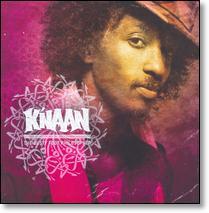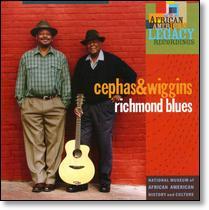A Consumer Guide to the Trailing Edge: August, 2008
Recycled Goods (#56)
by Tom Hull
 |
 |
With Jazz CG #17 done, I got a chance to catch up with some of that world music, and one Nigerian album led to another. So the count is up a bit this time. One thing that helped with some of the loose ends was being able to download some items from Rhapsody. Not the best way to review music, but works in a pinch. The K'Naan is technically a reissue, although it's new to me and probably to you. Brian Harnetty is a new record built around old parts. Cephas & Wiggins is a new record built around old concepts. All close enough for my purposes, mostly because they're worth the notice.
Cephas & Wiggins: Richmond Blues (2008, Smithsonian Folkways): No recording dates, so presumably these are new recordings, but the songs have been around as long as "John Henry" and "Careless Love." Guitarist-singer John Cephas and harmonicat Phil Wiggins have been toiling on the folk-blues circuit since 1981, a lower key Brownie McGhee/Sonny Terry act. Invited by the National Museum of African American History and Culture to survey Piedmont blues, they sum up their roots as authoritatively as Dr. John stirred up his Gumbo. A-
Brian Harnetty: American Winter (2007, Atavistic): Bits of radio news and advertisements, story, song, a little fiddle, from decades including WWII -- the ceremony launching the draft lottery is a centerpiece, matched with a snip of Arthur Godfrey singing "Praise the Lord and Pass the Ammunition" -- provide the human center for Harnetty's electronic soundtrack. Neither the music nor the samples are all that remarkable, but they merge into something deeply haunting. Seems like a highly repeatable formula, and Harnetty's discography lists 17 items since 2003, but this is the only one I've heard; for now that makes it unique. A-
K'Naan: The Dusty Foot Philosopher (2003-05 [2008], IM Culture): At age 11 three close friends were shot to death in one day. His 13-year-old brother was arrested for blowing up a federal court, and sentenced to death. Lots of rappers think they grew up in tough 'hoods, but try early '90s Mogadishu on for size. He got out at age 13, landing in Toronto. He picked up English through rap records, and navigates it like a native: at first this doesn't sound African at all, but eventually it seeps up through the roots; same for his experiences, which catch you by surprise emerging from music that's alternately sly and joyous. Philosophical, too, as when he wonders: "how can they go to war with terror when it's war that's terrorizing?" Released in 2006, but you missed it; back now in a "deluxe edition" with freebie DVD. Could be the record of the year. A
Nigeria 70: The Definitive Story of 1970's Funky Lagos (1964-80 [2001], AfroStrut, 3CD): Not exactly too much, but it is a lot to digest: two music CDs are built around stars Fela Anikulapo Kuti and King Sunny Adé but they also pack in less than extraordinary funk tracks, the sort of thing you might find on US obscurities comps -- the sort of thing you wouldn't have given a second thought to back in the day but now that those days are gone brings them back, albeit with a twist. Third CD is make or break: the soundtrack to Nigeria 70: The Documentary, mostly snatches of interviews -- Ginger Baker figures prominently -- with short history lessons, snatches of music, and a poem. Obviously, they should have included the DVD, but having complained about most of the DVDs I've seen included, I can't see penalizing them for that. A-
Princes Amongst Men: Journeys With Gypsy Musicians (1964-2007 [2008], Asphalt Tango): Presented as the soundtrack to Garth Cartwright's book of the same name, this could also serve as a sampler for the label's exceptional catalog -- their Sounds From a Bygone Age series on Romania, newer acts like Fanfare Ciocarlia -- but it goes further, picking up such notable artists as Boban Markovic and Taraf de Haidouks, and others I'm unfamiliar with. Cartwright, originally from New Zealand, first set foot in the Balkans in 1991, returning in 2003 to wander and write his way through Romania, Bulgaria, Macedonia, and Serbia. All are amply represented here, common threads with distinct local variations, much of it quite remarkable. Documentation raises more questions than it answers -- maybe a teaser for the book? A-
Sun Ra: Some Blues but Not the Kind That's Blue (1973-77 [2007], Atavistic): Two "small group" sessions -- 10 musicians is a bit below Arkestra weight, but not much -- that fell through the cracks and wound up in Atavistic's remarkable Unheard Music Series. Mostly covers, familiar songs like "My Favorite Things" and "Black Magic" shot into unforseen orbits. The horns cut the grease, but the piano (or organ on the 1973 tracks) dominates: Ra's mix of stride, bebop, and something from the outer reaches of the galaxy is pretty amazing. A-
Briefly Noted
David Bowie: Live in Santa Monica '72 (1972 [2008], Virgin/EMI): Official reissue of a legendary booleg from the Ziggy Stardust/Spiders From Mars tour. The usual caveats with live albums of the era apply -- sound a little tinny, songs less fully fleshed out than the studio versions -- but the excitement is palpable, and the show pulls several good records up to a new plateau. A-
Bill Cole's Untempered Ensemble: Proverbs for Sam (2001 [2008], Boxholder): A belated tribute to alto saxophonist Sam Furnace, who died two years later, but who in this Vision Festival set holds the musical center ground with super-bassist William Parker while the leader's squeaky Asian double-reeds (soona, shenai, nagaswarm, digeridoo), Cooper-Moore's diddly bow, and multiple percussionists swarm in pursuit of their otherworldly avant-exotica. A-
Lionel Hampton Orchestra: Mustermesse Basel 1953 Part 2 (1953 [2008], TCB): Another Swiss radio shot, with the vibraphonist's big band -- names include Art Farmer, Clifford Brown, Jimmy Cleveland, Gigi Gryce, and Quincy Jones -- doing their usual "Hey-Ba-Ba-Re-Bop": "Setting the Pace," "Flying Home," "Drinking Wine," always "On the Sunny Side of the Street." B+
Gene Harris Quartet: Live in London (1996 [2008], Resonance): A popular pianist in the Oscar Peterson mode with an occasional nod to Erroll Garner, not as well known in large part because he spent most of his career recording first as the Three Sounds, then in bassist Ray Brown's trio; Jim Mullen's sinuous guitar enlarges this from trio to quartet. B+
Sal Mosca: You Go to My Head (2001-06 [2008], Blue Jack Jazz): Private sessions from the late pianist's studio, a breezy, brainy set of Tristano school standards: four Gershwins, two by Dizzy Gillespie and/or Charlie Parker, one each by Lee Konitz and Warne Marsh -- the school's sax legends, a role admirably played here by Jimmy Halperin. B+
Nigeria 70: Lagos Jump: Original Heavyweight Afrobeat Highlife & Afro-Funk (1968-81 [2008], Strut): Back in the 1970s Nigeria seemed like the cradle of Afropop, with highlife bands maturing into complex juju and all sorts of hybridized beats, ranging from mundanely funky to hypnotically transcendental, but the largest country in Africa since fell into obscurity; how rich the 1970s were is attested by how easy it seems to be to assemble a seductive compilation from obscurities -- they don't even sound like lost gems, just everyday relics of a golden age. A-
Nigeria Disco Funk Special: The Sound of the Underground Lagos Dancefloor (1974-79 [2008], Soundway): Long funk instrumentals by long-forgotten obscurities -- T-Fire, Bongos Ikwue, Dr. Adolf Ahanotu, the Sahara All Stars of Jos, you get the idea -- some with superficial lyrics; nothing special, but they do keep it coming, the sine qua non of disco funk. B+
Nigeria Rock Special: Psychedelic Afro-Rock & Fuzz Funk in 1970s Nigeria (1970 [2008], Soundway): When the local riddims take charge, as on Original Wings' "Igba Alusi," you wonder why they ever settled for stodgy old rock grooves -- I mean, were they that impressed with Ginger Baker? More groups I recognize, but mostly from similar comps; an admirable piece of history, and it has its moments. B+
Putumayo Presents: Acoustic France (1994-2007 [2008], Putumayo World Music): Singer-songwriters working in the low-key folkie idiom, strumming guitars, spieling chansons; the best known is first lady Carla Bruni, who makes little impression and is immediately eclipsed by Keren Meloul, who does business as Rose. B
Putumayo Presents: African Party (1992-2008 [2008], Putumayo World Music): Another mild-mannered afropop compilation, drawing on recent records from artists who haven't made names for themselves (at least over here) instead of surefire classic tracks that remain equally unknown; starts in Guinea, moseys east and south to wind up weighted toward South Africa; Louis Mhlanga's "Rhumba All the Way" ties all these thread together. B+
Putumayo Presents: Québec (1993-2007 [2008], Putumayo World Music): More mild French-language folk-pop, mostly from the ranks of unknown newcomers this label regularly taps, with one token cut from La Bottine Souriante, a 1990s group that got some notice, and stands way ahead of this pack. B
Sun Ra: The Night of the Purple Moon (1964-70 [2007], Atavistic): Stripped down to a quartet, with electric bass underscoring Ra's goofball electric keyboards -- one's called the rocksichord -- and two saxophonists who have to provide percussion on the side; supplemented by 1964 solos on wurlitzer and celeste. B+
Additional Consumer News
Notes
Rhapsody stream reviews: David Bowie, Nigeria Special (3 compilations on Soundway).
Copyright © 2008 Tom Hull.